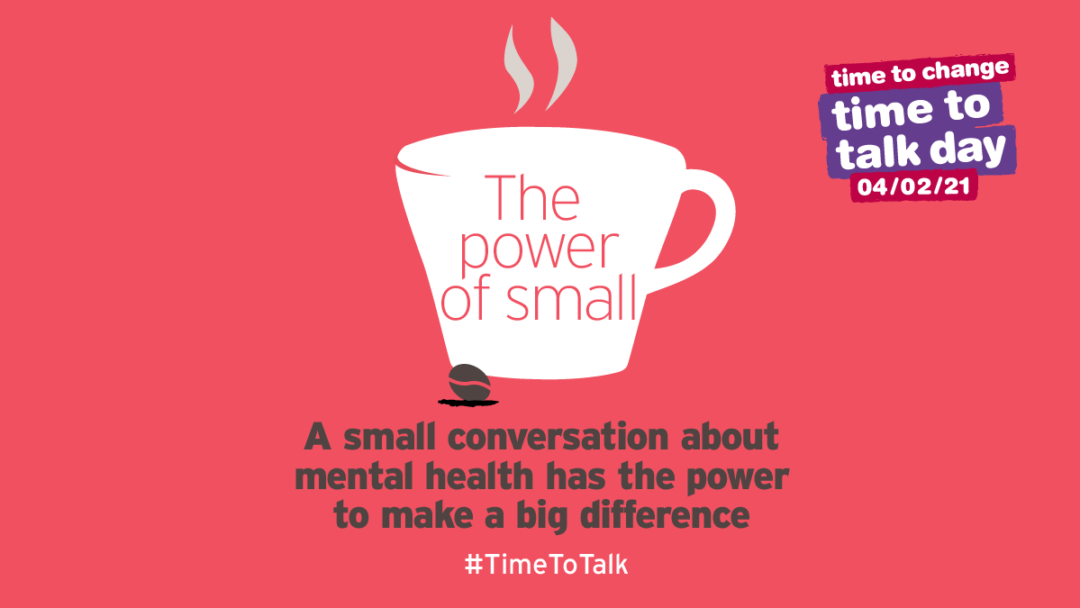Today is Time to Talk Day. The aim being, to get people to open up and talk about mental health, helping to break down barriers and myths. Mental health problems can affect anyone, regardless of age, race, religion, or background, and throughout the year, 1 in 4 of us will experience some kind of mental health issue.
Unfortunately, there are still some stigmas around mental health, and Time to Talk Day is about encouraging people to start conversations, helping to dispel some of the myths that surround it.
Types of Mental Health
We all have mental health; it just varies from person to person. Some people have good mental health and some have poor. But our frame of mind can affect how we think, act, and feel, it can also affect how we interact with others and how we handle stressful situations.
Our mental health can change daily. When it’s good, we are able to function properly. We think clearly and live our lives the way we want to, we wake feeling energised, and happy, ready to take on the day no matter what. When it’s poor, we might feel as though everything is too much, and spiral into unhelpful ways of thinking; our mood is low, we feel overwhelmed, emotional, or anxious.
Our mental health can be affected by both physical events and life events. Traumatic experiences, bereavement, injuries, or illness, can all affect how we think, act, and feel.

Mental Health Conditions
For people who suffer with serious mental health conditions, every day can be a struggle. Depression, anxiety, OCD, PTSD, bipolar, eating disorders, to name a few, can cause severe problems, making life difficult on a daily basis. Unfortunately, due to the stigma that surrounds it, some people will suffer alone in silence, too afraid or ashamed to ask for help.
No-one should be made to feel about that way, which is why we need to start the conversation. The more we talk, and share our experiences, the easier it will become for people to reach out and ask for help and support. The aim of Time to Change and Time to Talk Day is to put an end to mental health discrimination.
Talking Therapies
Being a trainee counsellor in person-centred therapy, I understand how talking can help us to work through problems. There are a variety of talking therapies available, including person-centred therapy, CBT (cognitive behavioural therapy), EMDR (eye movement desensitisation reprocessing), and Interpersonal Therapy (IPT). These are widely used to help a variety of issues, including depression, anxiety, eating disorders, OCD, and PTSD.
Some talking therapies can help explore past traumas, while some concentrate on the present moment, by changing negative thought patterns and behaviours. But all of them offer a safe and supportive space, in which to talk freely without judgement. There’s a talking therapy for everyone, you just might feel more suited to one over another.

Let’s Talk
If you know someone who you think might be struggling, ask them how they are or if they’re okay. If you’re not convinced by their answer, ask again. During the current pandemic, it’s especially important to check-in with our loved ones; family, friends, and neighbours.
Sometimes, we just need to talk, offloading our worries while someone else listens. It doesn’t have to be a professional, it just needs to be someone we can trust, like a friend, family member, or neighbour. Putting a voice to something that’s bothering us while someone else listens, is sometimes all we need. B.T. were right when they said, it’s good to talk. And with WhatsApp, Zoom and Face Time, you can even talk face-to-face.
But if you, or someone you know does have a mental health condition and needs professional help, please don’t be afraid to reach out and ask for it. There’s nothing wrong with needing a bit of extra support. If you feel more comfortable, reach out to someone you trust, and let them help you find the support that you need, but please, don’t think you have to deal with it alone. It’s okay, not to be okay.
Visit the charity Mind for general advice, or the BACP or Counselling Directory to find a qualified counsellor in your area. You can also visit the NHS to find a list of charities or find urgent support here.
Support
Alternatively, you can phone one of the support lines below.
Samaritans
Phone: 116 123 (24 hours a day, free to call)
Email: jo@samaritans.org
Website: https://www.samaritans.org
Provides emotional support for people experiencing feelings of distress or despair, including those that could lead to suicide.
Mind
Phone: 0300 123 3393 (9am-6pm Monday to Friday) or text 86463
Email: info@mind.org.uk
Website: www.mind.org.uk/information-support/helplines
Provides confidential mental health information services, and the Infoline gives information on types of mental health problems, where to get help, drug treatments, and alternative therapies.
Supportline
Phone: 01708 765200
Email: info@supportline.org.uk
Website: https://www.supportline.org.uk/
Supportline is aimed at those who are socially isolated, vulnerable, at risk groups and victims of any form of abuse.
Rethink Mental Illness Advice Line
Telephone: 0300 5000 927 (9.30am – 4pm Monday to Friday)
Email: advice@rethink.org
Website: http://www.rethink.org/about-us/our-mental-health-advice
Offers expert advice and information to people with mental health problems and those who care for them.






No Comments